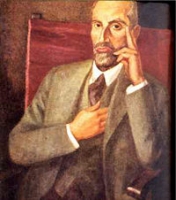yuèdòuxī méi nèi sī Juan Ramon Jimenezzài诗海dezuòpǐn!!! | |||
Ramón Jiménez was born in Moguer, near Huelva, in Andalusia, Spain, on 24 December 1881. He celebrated his home region in his prose poem about a writer and his donkey, called Platero y Yo (1914). He studied law at the University of Seville, but he declined to put this training to use. Strongly influenced by the poet Rubén Darío, he published his first two books, in 1900, at the age of eighteen. The death of his father in this same year affected him deeply, and the resulting depression led to his being sent to a mental institution in France. Ten years later, he was transferred to the Sanatorio de El Rosario in Madrid. Soon afterwards, he made several trips to France and the United States, where in 1916 he married Zenobia Camprubí, a noted translator of the Indian writer, Rabindranath Tagore. Zenobia became his indispensable companion and collaborator.
Upon the outbreak of the Spanish Civil War, he and Zenobia went into exile in Cuba, the United States, and Puerto Rico, where he settled in 1946. Ramón Jiménez was hospitalized for eight months due to another deep depression. Ramón Jiménez later became a Professor of Spanish Language and Literature at the University of Maryland at College Park. In 1956, he received the Nobel Prize in Literature; three days later, his wife died of vaginal cancer. Ramón Jiménez never quite recuperated from this loss. He died two years afterwards, on 29 May 1958, in the same clinic where his wife had died. Both are buried in Spain.
Although primarily a poet, Ramón Jiménez achieved popularity in the United States with the translation of his prose work Platero y yo (1917; "Platero and I"), the story of a man and his donkey. He also collaborated with his wife in the translation of the Irish playwright John Millington Synge's Riders to the Sea (1920). His poetic output during his life was immense. Among his better-known works are Sonetos espirituales 1914–1916 (1916; “Spiritual Sonnets, 1914–15”), Piedra y cielo (1919; “Stones and Sky”), Poesía, en verso, 1917–1923 (1923), Poesía en prosa y verso (1932; “Poetry in Prose and Verse”), Voces de mi copla (1945; “Voices of My Song”), and Animal de fondo (1947; “Animal at Bottom”). A collection of 300 poems (1903–53) in English translation by Eloise Roach was published in 1962.
His literary influence on Puerto Rican writers is felt deeply in the works of island writers Giannina Braschi, René Marqués, and Manuel Ramos Otero.
Honors
The University of Maryland has a building on campus and a living-and-learning writing program named in his honor.
See also
Moguer
Casa Museo Zenobia y Juan Ramón
Casa Natal Juan Ramón Jiménez
Fuentepiña
References
E. Díez-Canedo, Juan Ramón Jiménez en su obra (México, 1944)
R. Gullón, Conversaciones con Juan Ramón Jiménez (Madrid, 1958)
J. Guerrero Ruiz, Juan Ramón de viva voz (Madrid, 1961)
M. P. Predmore, La obra en prosa de Juan Ramón Jiménez (Madrid, 1966)
P.R. Olson, Circle of Paradox:Time and Essence in the Poetry of Juan Ramon Jimenez (Baltimore, 1967)
M. A. Salgado, El arte polifacético de las caricaturas líricas juanramonianas (Madrid, 1968)
Mª T. Font, «Espacio»: autobiografía lírica de Juan Ramón Jiménez (Madrid, 1973)
G. Palau de Nemes, Vida y obra de Juan Ramón Jiménez (Madrid, 1976)
A. Campoamor González, Vida y poesía de Juan Ramón Jiménez (Madrid, 1976)
A. De Albornoz (ed.), Juan Ramón Jiménez (Madrid, 1981)
A. Campoamor, Bibliografía general de Juan Ramón Jiménez (Madrid, 1982)
F. J. Blasco, La Poética de Juan Ramón Jiménez. Desarrollo, contexto y sistema (Salamanca, 1982)
M. Juliá, El universo de Juan Ramón Jiménez (Madrid, 1989)
